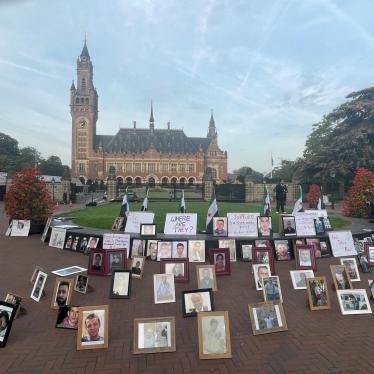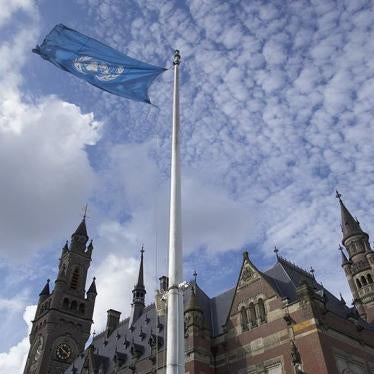Dear Minister Yeşilgöz-Zegerius,
We are writing ahead of the “Justice Ministers Conference: Supporting the ICC and its Investigation into the Situation in Ukraine,” co-organized by the United Kingdom and the Netherlands and scheduled to take place in London on March 20. Human Rights Watch urges your government to use this opportunity to ensure support for the International Criminal Court (ICC) across all situations under its jurisdiction.
During its last session in December, the ICC Assembly of States Parties “reaffirmed its support for the consistent implementation of the Court’s mandate across the situations and cases under its jurisdiction in the interests of justice and the victims’ right of access to justice.” This is an important declaration of states parties’ commitment to a consistent approach in their support for the court and its global mandate.
The adoption of this language by the Assembly took place against the backdrop of what has been unprecedented political support expressed by some ICC member countries for opening an investigation in Ukraine, including those countries that came together to refer the situation to the court’s Office of the Prosecutor in March 2022. This has put a much-needed spotlight on accountability for serious international crimes and the central role of the ICC in the broader Rome Statute system of justice. At the same time, there is certainly a risk that if similar support is not expressed for the court’s work in each of its situations, this spotlight may instead serve to reinforce perceptions of politicized selectivity in the operation of international justice. That is to say, perceptions that governments prioritize justice for some victims and survivors over others.
This risk is exacerbated in the context of Ukraine by the strong response of many governments to the ICC prosecutor’s call for voluntary contributions and secondments to support the office's work shortly after the opening of the Ukraine investigation. While these resources were sought by the Office of the Prosecutor to support the office’s work across the board, some governments explicitly linked their contributions in public messaging to the investigation in Ukraine. This stood in stark contrast to the reluctance of some ICC member countries to increase the court’s regular budget in recent years as the court’s workload clearly outpaced the resources available to it, limiting its effectiveness in delivering justice to victims in situations open before it. Voluntary contributions are clearly envisioned as exceptional within the court’s regulatory framework; they raise concerns about perceptions of independence and sustainability.
Indeed, in his General Debate statement at the December Assembly of State Parties session, Minister Hoekstra emphasized the need to “provide the Court with an adequate budget [as] the only way to ensure that the ICC can remain financially sustainable and carry out its mandate.”
We urge you to seize this opportunity not only to advance discussions on support to the investigation in Ukraine, but to broaden out your discussions. The conference should serve to emphasize a shared commitment to support building out the ICC and the global system of international justice to ensure the court and the system have the capacity to inclusively address the all-too-real demands for justice that fall within its jurisdiction. While every situation is different, the elements of success for the court in Ukraine, and which may be the subject of discussion at the conference, are also essential for the court’s success everywhere.
Therefore, we call on you to:
- Ensure ministerial/your statements and publicity given to the conference situate discussion of the Ukraine investigation in an explicit broader commitment to the ICC’s work and to impartial justice for serious international crimes;
- Commit, in any outcomes to the conference, to ensure lessons learned in the context of Ukraine are informed by practice to date in other ICC situations, including in the relationship between the ICC and national jurisdictions under the principle of complementarity, and can be carried forward to ensure the ICC can effectively and consistently deliver on its mandate wherever it is needed;
- Call on Ukraine to join the Rome Statute system as a key advance in promoting the universality of the ICC treaty;
- Situate any discussion of additional financial or human resources needed by the Office of the Prosecutor in the context of a broader discussion about the real investment needed on a court-wide basis and through the court’s regular assessed budget to best support its global mandate, as well as its judicial and prosecutorial independence; and
- Ensure civil society organizations, particularly groups working with affected communities, are represented at the conference and included in discussions around the different types of support needed for the fulfilment of the court’s global mandate.
The opening of the investigation in Ukraine has brought renewed attention to the work of the ICC and its central role in the international justice eco-system, as the Rome Statute’s 25th anniversary nears. The upcoming Justice Ministers Conference is a crucial opportunity to harness this attention to the benefit of the court’s global mandate, counter perceptions of selectivity and politicization in the court’s work and ensure victims’ access to justice regardless of where the crimes are committed and by whom.
Sincerely,
Elizabeth Evenson
Director, International Justice Program
Human Rights Watch
Copying to the Ministry of Foreign Affairs.







